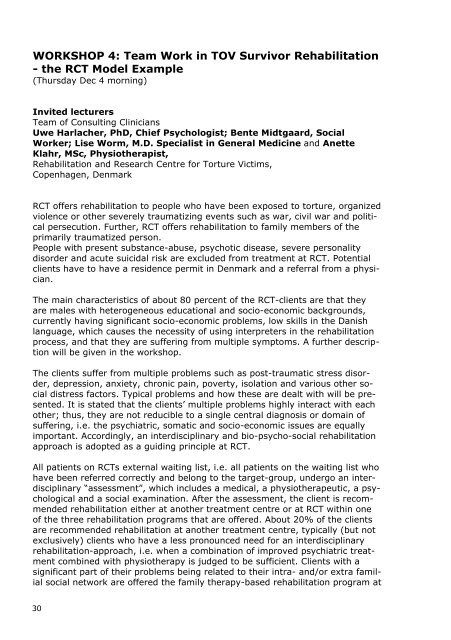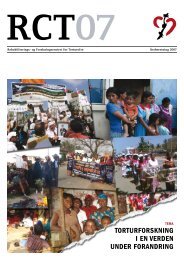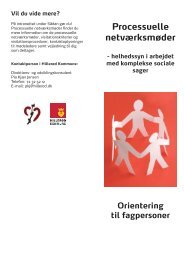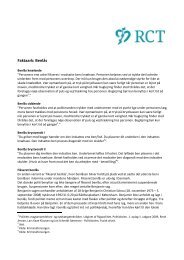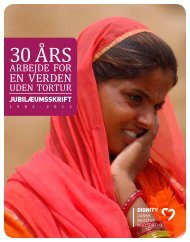Rehabilitating Torture Survivors - Dignity - Danish Institute Against ...
Rehabilitating Torture Survivors - Dignity - Danish Institute Against ...
Rehabilitating Torture Survivors - Dignity - Danish Institute Against ...
Create successful ePaper yourself
Turn your PDF publications into a flip-book with our unique Google optimized e-Paper software.
WORKSHOP 4: Team Work in TOV Survivor Rehabilitation- the RCT Model Example(Thursday Dec 4 morning)Invited lecturersTeam of Consulting CliniciansUwe Harlacher, PhD, Chief Psychologist; Bente Midtgaard, SocialWorker; Lise Worm, M.D. Specialist in General Medicine and AnetteKlahr, MSc, Physiotherapist,Rehabilitation and Research Centre for <strong>Torture</strong> Victims,Copenhagen, DenmarkRCT offers rehabilitation to people who have been exposed to torture, organizedviolence or other severely traumatizing events such as war, civil war and politicalpersecution. Further, RCT offers rehabilitation to family members of theprimarily traumatized person.People with present substance-abuse, psychotic disease, severe personalitydisorder and acute suicidal risk are excluded from treatment at RCT. Potentialclients have to have a residence permit in Denmark and a referral from a physician.The main characteristics of about 80 percent of the RCT-clients are that theyare males with heterogeneous educational and socio-economic backgrounds,currently having significant socio-economic problems, low skills in the <strong>Danish</strong>language, which causes the necessity of using interpreters in the rehabilitationprocess, and that they are suffering from multiple symptoms. A further descriptionwill be given in the workshop.The clients suffer from multiple problems such as post-traumatic stress disorder,depression, anxiety, chronic pain, poverty, isolation and various other socialdistress factors. Typical problems and how these are dealt with will be presented.It is stated that the clients’ multiple problems highly interact with eachother; thus, they are not reducible to a single central diagnosis or domain ofsuffering, i.e. the psychiatric, somatic and socio-economic issues are equallyimportant. Accordingly, an interdisciplinary and bio-psycho-social rehabilitationapproach is adopted as a guiding principle at RCT.All patients on RCTs external waiting list, i.e. all patients on the waiting list whohave been referred correctly and belong to the target-group, undergo an interdisciplinary“assessment”, which includes a medical, a physiotherapeutic, a psychologicaland a social examination. After the assessment, the client is recommendedrehabilitation either at another treatment centre or at RCT within oneof the three rehabilitation programs that are offered. About 20% of the clientsare recommended rehabilitation at another treatment centre, typically (but notexclusively) clients who have a less pronounced need for an interdisciplinaryrehabilitation-approach, i.e. when a combination of improved psychiatric treatmentcombined with physiotherapy is judged to be sufficient. Clients with asignificant part of their problems being related to their intra- and/or extra familialsocial network are offered the family therapy-based rehabilitation program at30


